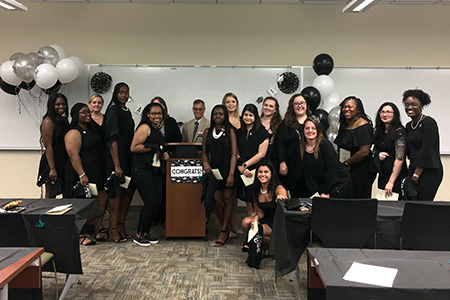Savannah Tech Dental Assisting students celebrate program completion
 Savannah, GA – Sixteen students from Savannah Technical College’s Dental Assisting program were recently pinned at the completion of their program. This cohort had 100% retention during the 55-credit hour program and 100% passed the Expanded Functions for Georgia (EFDA) exam. Half of these students had full-time employment with job offers from the clinical sites where they worked this spring.
Savannah, GA – Sixteen students from Savannah Technical College’s Dental Assisting program were recently pinned at the completion of their program. This cohort had 100% retention during the 55-credit hour program and 100% passed the Expanded Functions for Georgia (EFDA) exam. Half of these students had full-time employment with job offers from the clinical sites where they worked this spring.
The Dental Assisting program at Savannah Technical College prepares students for employment in a variety of positions in today’s dental offices. The Dental Assisting program provides learning opportunities which introduce, develop, and reinforce academic and occupational knowledge, skills, and attitudes required for job acquisition, retention, and advancement. Additionally, the program provides opportunities to upgrade present knowledge and skills or to retrain in the area of dental assisting. Graduates of the program receive a Dental Assisting diploma.
Satisfactory completion of all program courses entitles students to participate in the Dental Assisting National Board Certified Dental Assistant (CDA) examination and certification process.
The program in dental assisting is accredited by the Commission on Dental Accreditation [and has been granted the accreditation status of “approval without reporting requirements”]. The Commission is a specialized accrediting body recognized by the United States Department of Education. The Commission on Dental Accreditation can be contacted at (312) 440-4653 or at 211 East Chicago Avenue, Chicago, IL 60611. The Commission’s web address is: http://www.ada.org
###
#1944 | May 28, 2019
Media Contact: Amy Shaffer, APR
912.443.5512 or ashaffer@savannahtech.edu
Health Sciences Academic Advisor: Cindy Cole
ccole@savannahtech.edu
Savannah Technical College serves Coastal Georgia with quality, market-driven technical education with campus locations in Chatham, Effingham and Liberty Counties. Serving more than 10,000 credit and non-credit students annually, Savannah Tech offers nearly 150 different instructional programs in Aviation Technology, Business and Professional Services, Industrial Technology, and Health Sciences in addition to Adult Education classes, industry-specific training and continuing education. The College serves as an economic and community development partner for the region, offering corporate and customized training and assessment programs for business and industry.
Savannah Technical College is accredited by the Southern Association of Colleges and Schools Commission on Colleges (SACSCOC) to award associate degrees, diplomas and technical certificates of credit. Questions about the accreditation of Savannah Technical College may be directed in writing to the Southern Association of Colleges and Schools Commission on Colleges at 1866 Southern Lane, Decatur, GA 30033-4097, by calling (404) 679-4500, or by using information available on SACSCOC’s website (www.sacscoc.org).
